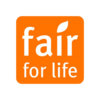
Fair for Life
Standard Owners (1)
| Name | Country | |
|---|---|---|
| GROUP ECOCERT | 🇫🇷 France |
About (Fair for Life)
The Fair for Life standard is a certification program that promotes fair trade and social responsibility in agricultural and manufacturing supply chains. It is designed to ensure that producers and workers are treated fairly and ethically, and that social, environmental, and economic sustainability is promoted throughout the entire supply chain.
The Fair for Life certification covers a wide range of products, including agricultural commodities, processed foods, cosmetics, textiles, and more. It is applicable to both small-scale producers and large companies.
The key principles of the Fair for Life standard include:
Fair trade practices: The certification ensures that producers receive fair prices for their products, allowing them to cover their production costs and improve their livelihoods. It also promotes direct trade relationships, transparency, and long-term partnerships.
Social responsibility: The standard requires that workers are treated with dignity and respect. It prohibits forced labor, child labor, and discrimination. It also promotes safe and healthy working conditions and provides opportunities for skill development and empowerment.
Environmental sustainability: The certification encourages environmentally responsible practices, such as organic farming, resource conservation, waste management, and the protection of biodiversity. It aims to minimize the negative impact on the environment and promote sustainable production methods.
Community engagement: The Fair for Life standard emphasizes community development and involvement. It encourages producers and companies to contribute to the social and economic development of local communities by investing in education, healthcare, infrastructure, and other initiatives.
To achieve Fair for Life certification, companies must undergo a thorough assessment and meet the requirements set forth by the standard. Regular audits and inspections are conducted to ensure compliance with the principles and criteria of the certification.
The Fair for Life label allows consumers to identify products that have been certified as meeting the fair trade and social responsibility standards. It empowers consumers to make informed choices and support companies that prioritize ethical and sustainable practices.
The Fair for Life standard plays a vital role in promoting fair trade, social responsibility, and sustainable development. It helps to create a more equitable and sustainable global supply chain by supporting producers and workers, protecting the environment, and fostering community development.